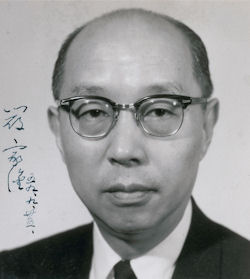Yen Chia-kan
 Yen Chia-kan was President of Taiwan from 1975 to 1978. Yen, who was born in Jiangsu Province, in southeastern China, received a bachelor's degree from St. John's University in Shanghai. Yen, who was often called C. K. Yen in the English-language press, went on to hold Government posts in Taiwan in the late 1940's and, after the Nationalists fled there in 1949, served as Prime Minister as well as in various Cabinet posts.
Yen Chia-kan was President of Taiwan from 1975 to 1978. Yen, who was born in Jiangsu Province, in southeastern China, received a bachelor's degree from St. John's University in Shanghai. Yen, who was often called C. K. Yen in the English-language press, went on to hold Government posts in Taiwan in the late 1940's and, after the Nationalists fled there in 1949, served as Prime Minister as well as in various Cabinet posts.
Yen Chia-kan assumed office as Premier in December of 1963. While still Premier, is elected in May of 1966 as Vice President. Republic of China is hard hit by the termination of US aid and loses its United Nations membership, but still achieves the goals of its two four-year economic plans, which leads to a significant increase in investment and export trade. In 1970, Taiwan starts to enjoy a trade surplus, a high annual economic growth rate of 10.7 %, and a low inflation rate of 3.7%, outperforming many other countries in achieving the double goals of economic growth and price stability. Observers in the international community begin to speak of a “Taiwan economic miracle.” In addition, an export processing zone is established in December 1966 in order to stimulate Taiwan's economic growth and develop its export-oriented light industry. This pioneering undertaking successfully attracts investment from home and abroad, and greatly expands Taiwan's exports of industrial products.
The National Assembly elected Premier YEN Chia-kan Vice President of the Republic of China March 21, 1966; and Yen was inaugurated (along with President CHIANG Kai-shek, elected for his fourth term) on May 20. At 61 years of age, Yen has been a key administrative official in Taiwan since the KMT took over the island from the Japanese in 1945. He had served as Minister of Economic Affairs, Minister of Finance, and Governor of Taiwan. He became premier in December 1963. Yen was an economist of international reputation and an important figure in the group of government officials that successfully sought the adoption of measures for the acceleration of Taiwan's economic development.
Although a highly capable administrator, he was considered to be without any important degree of personal political power. His scholarly manner, his good command of English and familiarity with American and European affairs, derived from numerous travels and participation in international financial activities (a Director IMF and IBRD), made Yen stand in marked contrast to other senior Taiwan officials, most of whome came from military backgrounds. Yen was is believed to be on good terms with other officials and was probably the one most acceptable tc the Taiwanese.
The selection of Yen as Vice President marked him as Chiang Kai-shek's choice as titular successor. Yen, however, lacked the following and charisma to replace Chiang as Taiwan's political leader and would have to trade heavily on the prestiqe of office and his talents as a bureaucrat if he was to exercise real influence of his own. The impression he conveyed as a competent administrator deeply interested in the economic betterment of Taiwan and its people would be helpful in dispelling some of the public misconceptions about the KMT and its policies.
On 05 April 1975 he was sworn in as President upon the death of President Chiang Kai-shek. Integrates domestic political and economic resources and successfully oversees a smooth constitutional transfer of power. In the meantime, he strongly supports the plans of Premier Chiang Ching-kuo to push forward with the Ten Major Construction Projects, promote external trade, increase the gross national product, and set up incentive plans for the establishment of the capital- and technology-intensive Hsinchu Science-based Industrial Park. These measures enable Taiwan to become a model for other emerging industrial regions.
Yen died on 24 December 1994 in Taipei Veterans General Hospital in Taipei. Yen suffered a brain hemorrhage that left him bedridden more than seven years ago and that his condition had worsened after a second hemorrhage in 1992.
|
NEWSLETTER
|
| Join the GlobalSecurity.org mailing list |
|
|
|

